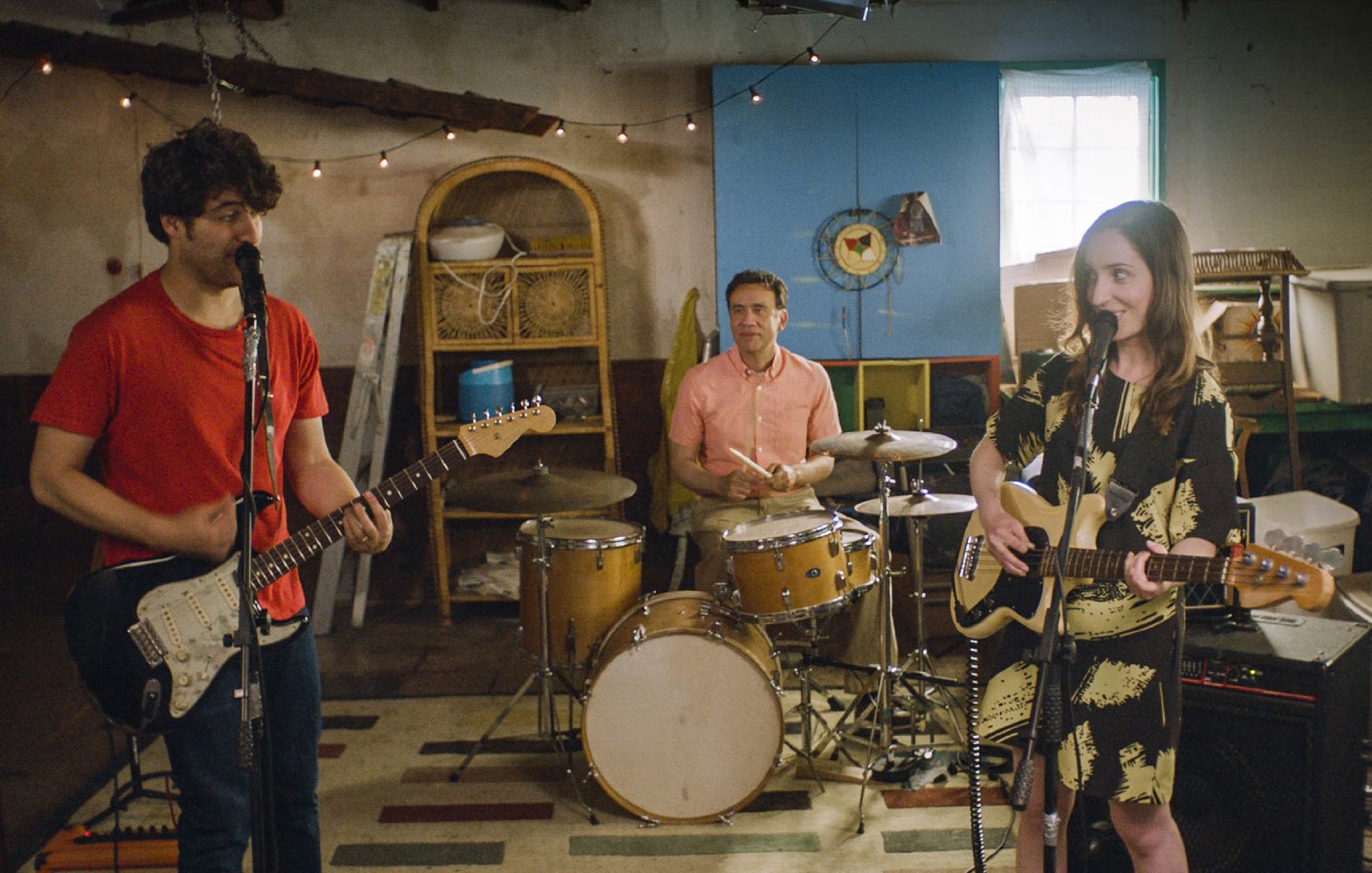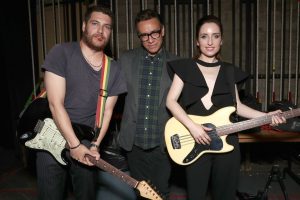Zoe Lister-Jones Explores the Unique Struggles of a Long Term Relationship in Band Aid

Director Zoe Lister-Jones talks about working with an all-female crew, exploring relationship power dynamics, and expressing Jewish identity in her film Band Aid.
Actor, writer, and musician Zoe Lister-Jones has just added a new credit to her resume: director. The Life in Pieces star and scribe for Breaking Upwards, Lola Versus, and Consumed makes her directorial debut with Band Aid, a dramedy she wrote and stars in.
Band Aid centers on Anna (Lister-Jones) and Ben (Adam Pally), a Jewish couple whose relationship is on the verge of collapse because of their constant bickering. A lucky series of events allow them to realize a shared love of music. As a last-ditch effort to save their marriage, Anna and Ben decide to start a band with their neighbor (Fred Armisen) to work out their differences through raw, acerbic songs. The further they get into the process, the more their relationship starts to mend. Everything comes to a head when they’re finally forced to confront the underlying source of their troubles: a miscarriage they’ve failed to fully address.
The Independent’s Evan Crean caught up with Lister-Jones about the film’s exploration of a marriage—its deep wounds and power dynamics–her decision to hire an all-female crew for Band Aid, and how Jewish identity enters into her art.
Evan Crean: So where did you come up with the idea for this film?
Zoe Lister-Jones: I was really just looking to write a script I thought I could have a lot of fun writing. I had written a number of screenplays – feature screenplays in the past, and I think I had lost the joy in the process. So from soup to nuts, this film for me was about finding joy in the process, rather than being so focused on the product. I had been writing songs and lyrics for many years. I was in a band in high school and college, and I knew that I would have the most fun writing music, so I started by writing the songs. For me, relationships are always endlessly interesting to explore as an artist, and I felt that I hadn’t seen a long-term relationship portrayed that authentically onscreen and really exploring why a couple chooses to stay together. So it was really those two things in combination that led to Band Aid.

EC: I read that you wanted to explore power dynamics in long-term relationships, and I loved how the dirty dishes and the leaky faucet seemed like a metaphor for what’s wrong in Anna and Ben’s relationship. Could you talk about the choice to use these plot devices to explore larger interpersonal issues?
Lister-Jones: I think the ways in which couples fight varies, but generally I think there is a universality to the things that can chip away at a heterosexual relationship, which is all I can speak to personally. The more that I would talk to my friends who are in long-term relationships, the more I would realize that we were all fighting about the same things. Whether or not they were actually the same things underneath, the sort of superficial top layer where all the fights were beginning was around dishes, basically, and how a man and a woman cohabitate because we were raised with very different habits. That to me was a place where I could mine a lot of comedy but also get into the nitty-gritty of the power dynamics in a relationship. And yeah, as a metaphor, I think the drip is that there will always be something that is nagging at your relationship. Your relationship will never just be smooth sailing, and that’s okay—it doesn’t mean that you have to sell the whole house—it means that you have to fix the drip and there might now, next week, be a different thing you have to fix, but to me, that’s what it really means to love someone. To continue to mend whatever is broken.
EC: I read that it was an all-female crew for Band Aid. Could you talk a little bit about that decision?
Lister-Jones: I think there has been a lot more dialogue publicly about the underrepresentation of women in television and film crews. But sadly there’s a study, I think that San Diego State University did in 2014, just showing the stats of the number of female directors, cinematographers, writers, producers, and they did the study again in 2016. I would say between those two years the dialogue kind of exploded around that issue, the numbers actually got worse. For me, I didn’t know those stats when I made the decision to hire an all-female crew, but in reading them since, I knew instinctively that something needed to happen that was subverting the paradigm completely, in order to effect any change, because even some of the female department heads that I was hiring, were really pushing to hire men.
EC: Really? That’s interesting…
Lister-Jones: Yeah, it wasn’t all of them, but some of them. They want to make their best work, and because they’re in charge of their own product, or department they’ll be in, they don’t want to take a risk on someone who has less experience. That’s generally what it boils down to. But, it’s such a catch-22 because how can women gain that experience if they’re never given the opportunity? For me, I wanted to offer opportunities to women in departments where they are rarely given them, especially in camera and grip and electric and sound. Also, I just really wanted to see what it would feel like because, obviously, I have really wonderful working relationships with men, but something really special and specific happens when women work in community together.
EC: I wanted to talk about the miscarriage in the film because so many people struggle with infertility and miscarriages, but it’s something we don’t really talk about in society. Could you talk about why you chose to have Anna and Ben go through that struggle?
Lister-Jones: For me, the idea of loss and grief in a relationship is something that’s very specific to the loss of a child and miscarriage, but also I think every couple has to navigate grief in whatever form that is, whether it’s losing a parent, or a friend, or mourning a relationship even. So, I think the element of the miscarriage was specific in some ways, not to my own personal experience, but to people who are very dear to me. I was watching a lot of friends go through that and how painful it was, and how difficult it was on a relationship. But I think also the fact that Anna and Ben are sort of grieving their own lives, like as artists, metaphorically speaking, your art also becomes your child or children, and these are two artists who have not only lost a baby, but also have lost their art. I think that they’re grieving so many things in their relationship that it just felt like the perfect storm of the thing that threatens to break them.

EC: Ben and Anna are Jewish, and you’ve played a lot of Jewish characters in television and film. Could talk about how Jewish identity plays into your art?
Lister-Jones: I was raised going to a conservative egalitarian synagogue my whole life in Brooklyn. For me, unlike so many of my friends who were raised Jewish, I loved going to synagogue. I think the Jewish household that my mom raised me in, and the Jewish community that my mom raised me in, was very much about spirituality and Jewish renewal, and Talmudic studies, and kind of larger, philosophical questions, which is so much a part of the Jewish tradition. I think if you’re only going to synagogue only on High Holidays, it can start to feel like a chore to so many kids. For me it never felt like a chore, it was really a part of the fabric of my life, in a way that enriched it. I don’t know if that led me to playing more Jewish characters. I didn’t like seek them out, but I think because I was raised in Brooklyn, Arranged came to me, in which I played an Orthodox Jewish character. And, I had been around so many Orthodox Jews in my upbringing that the rhythm of the way they speak in Brooklyn came very naturally to me. Once I did that, it opened the door for so many other Orthodox Jewish roles for me to play. In one year I think I played like four.
EC: Wow.
Lister-Jones: So, I cornered the market. I think on TV sets, like on a Christmas episode, I try to at least push for a menorah. Or push for something like that because it’s so hard to come by. This year, on my show Life in Pieces, I asked for a Hanukkah sweater, since it was an ugly Christmas sweater episode. And the costume designer went and found me one. It had dreidels on it. I represented hardcore. But yeah, these characters in Band Aid are Jewish, and I think that was important to me because it specifies the kind of nuances in how they relate to each other. There are a number of Jewish references in the film and the comedy draws upon that sensibility a lot. Both Adam and I are New York Jews, so that helped a lot. It came very naturally.
EC: I noticed that you’ve been on almost every Law & Order, and I was wondering, was that something you were planning to do? Or did it just happen?
Lister-Jones: I have the Law & Order equivalent of an EGOT. I challenge a person to come forward if they have more than me. I’ve done them all—I was on Trial by Jury, which was only on for one season. Very few people have that one under their belt. The only one I wasn’t on was Los Angeles, which doesn’t count.
EC: I didn’t even know that one existed.
Lister-Jones: I went to NYU, and then I graduated and started working as an actor in New York, and that’s just sort of a rite of passage to do Law & Order. I guess that they liked me, so they had me return for every single franchise, in every different incarnation, which was a lot of fun. I called that year of my life “Crying for Cash” because I played—one of them was an Orthodox Jew— I played the sister of a murdered woman, then I played a junkie who was murdered and found rotting in a trunk. Then I played the murderer herself. That was the most fun.
EC: Oh, I bet.
Lister-Jones: It was fun. Working on Law & Order is like an actor’s bat mitzvah. You have to sort of grow up while you’re doing it.
Regions: California, Los Angeles
